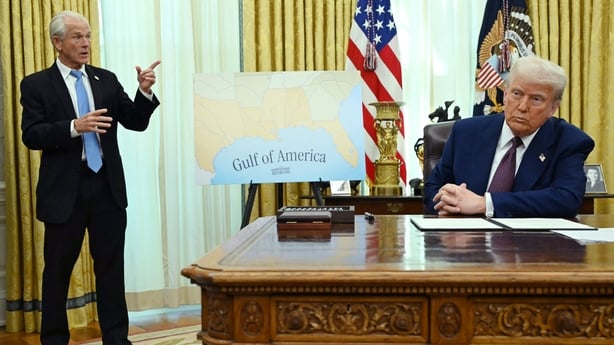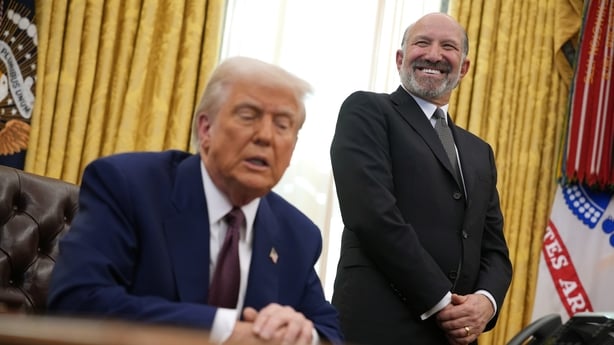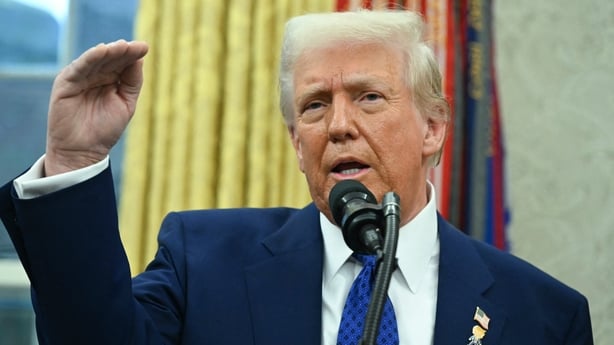US President Donald Trump has inked plans for sweeping "reciprocal tariffs" that could hit both allies and competitors, in a dramatic escalation of an international trade war that economists warn could fuel inflation in the US.
Speaking in the Oval Office, Mr Trump said he had decided to impose the reciprocal duties, telling reporters that US allies were often "worse than our enemies" on trade.
In particular, he singled out the European Union for being "absolutely brutal" in its trade ties with Washington.
The levies would be tailored to each US trading partner and consider the tariffs they impose on American goods, alongside taxes seen as "discriminatory," such as value-added taxes (VATs), said a White House official on condition of anonymity.
With the memo Mr Trump signed, the US trade representative, commerce secretary and other officials will propose remedies on a country-by-country basis.
Washington will start by examining economies with which the United States has its biggest deficits or "most egregious issues," the White House official added.
"This should be a matter of weeks, in a few months, but not much longer than that," the official said.
Ahead of Mr Trump's Oval Office comments, Trump trade advisor Peter Navarro told reporters: "Major exporting nations of the world attack our markets with punishing tariffs and even more punishing non-tariff barriers."

Concerns tariffs will lead to higher prices
Cost-of-living pressures were a key issue in the November election that saw Donald Trump return to power, and the Republican has promised to swiftly reduce prices.
But economists caution that sweeping tariffs on US imports would likely boost inflation, not reduce it, in the near term and could weigh on growth eventually.
Mr Trump acknowledged that US prices "could go up" due to tariffs, but he expressed confidence that they would ultimately ease.
Since taking office, Mr Trump has announced a broad range of tariffs targeting some of the biggest US trading partners, arguing that they would help tackle unfair practices - and in some cases using the threats to influence policy.
The president has referred to tariffs as a way to raise revenue, remedy trade imbalances and pressure countries to act on US concerns.
Last week, Mr Trump imposed an additional 10% tariff on Chinese goods, effective 4 February, with Chinese countermeasures taking effect this week.
He delayed a 25% tariff on goods from Mexico and Canada until 4 March to allow negotiations over steps to secure US borders and halt the flow of the drug fentanyl.
Some US workers have welcomed the metal tariffs, but manufacturing firms and other businesses have warned the hike would lead to higher prices.
"You can't change your supply chain overnight, and with the number and pace of these changes, even if you tried to stay ahead of it, can you stay ahead of it?" said David Young, an executive with the Conference Board, a global business group.

Europe's steel makers are also worried that US tariffs will lead to a flood of cheap steel into Europe. Canadian Prime Minister Justin Trudeau, speaking to reporters in Brussels, said some Americans would lose their jobs and US growth would suffer from Mr Trump's metals tariffs.
Meanwhile, the EU will prioritise negotiations over retaliatory countermeasures to avoid a damaging trade war, officials signalled yesterday.
An EU government official said ministers considered reinstating countermeasures imposed in 2018 on products like bourbon and Harley-Davidson motorcycles in response to Mr Trump's tariffs on steel and aluminium.
EU trade chief Maroš Šefčovič spoke yesterday with National Economic Council director Kevin Hassett, Mr Lutnick and US trade representative nominee Jamieson Greer.
US has been 'treated unfairly', says official
The White House official said that the United States has been "treated unfairly," saying a lack of reciprocity is a reason behind the country's "persistent annual trade deficit in goods" which topped $1 trillion last year.
One issue US officials singled out was the EU's 10% tariff on US vehicles, while the United States charges only 2.5%.
But Sean Bray, policy director of Tax Foundation Europe, noted that the United States might have higher levies on other products, such as a 25% rate on imports of light trucks.

Mr Trump also criticized "certain areas of Europe" for a VAT tax of about 20%, with Mr Navarro calling the EU the "poster child" for unfair trade with the United States.
Mr Trump's announcement came shortly before he was due to meet Indian Prime Minister Narendra Modi in Washington.
Analysts have warned that reciprocal duties could bring a broad tariff hike to emerging market economies such as India and Thailand, which tend to have higher effective tariff rates on US products.
Countries such as South Korea that have trade deals with Washington are less at risk, analysts believe.
Read more: Trump says tariff 'pain' will be 'worth the price'
India offered some quick tariff concessions ahead of Mr Modi's visit, including on high-end motorcycles.
During election campaigning, Mr Trump promised: "An eye for an eye, a tariff for a tariff, same exact amount."
For example, if India imposes a 25% tariff on US autos, the US will have a 25% tariff as well on imports of autos from India, financial services group Nomura said in a report this week.
The consideration of non-tariff factors might shift this calculus.
"Trump's objective of implementing reciprocal tariffs is to ensure fair treatment for US exports, which could indirectly also address US trade imbalances with partner countries," Nomura analysts said.
'No justification for imposition of tariffs' - Tánaiste
Tánaiste and Minister for Foreign Affairs Simon Harris said he sees "no justification" for the imposition of US tariffs on EU exports.
"I note President Trump's announcement this evening in relation to reciprocal tariffs, reflecting his previous comments on planned tariffs to be imposed by the US in the coming weeks.
"Tariffs create economic disruption and drive inflation, hurting all sides. We see no justification for the imposition of tariffs on EU exports," he said.
Mr Harris added: "We will work with EU partners to measure the impact of this announcement across all sectors, and we will calibrate our response on that basis.
"Increased protectionism is not in the interests of businesses or the global economic environment. It does not benefit the EU, Ireland or the US.
"As I said after the meeting of EU Trade Ministers yesterday, retaliation isn't the EU's preferred option - we support ongoing engagement with the US while ensuring a firm, proportionate response.
"Protecting Irish and European businesses, workers, and consumers is my priority."

